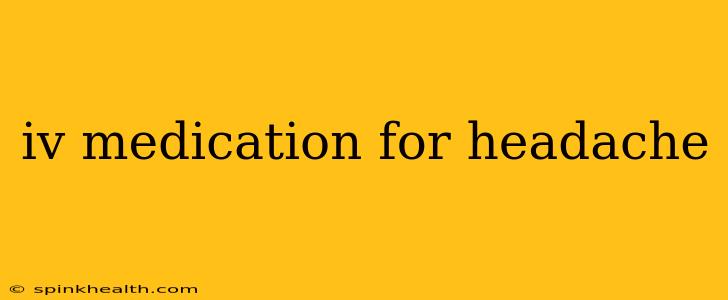IV Medication for Headache: When Oral Options Fail
The throbbing pain, the nausea, the overwhelming urge to just escape the light – a severe headache can be debilitating. When over-the-counter pain relievers and even stronger oral medications fail to provide relief, intravenous (IV) medication might be the answer. This isn't a first-line treatment for every headache, but for those suffering from particularly intense or intractable pain, IV therapy offers a powerful, fast-acting solution. Let's delve into the specifics.
What types of headaches might require IV medication?
This is a crucial question, and the answer isn't a simple one. IV medication isn't a catch-all for any headache. It's reserved for severe cases where other methods have proven ineffective. Conditions that might necessitate IV therapy include:
- Migraine with severe aura: Intense migraines accompanied by neurological symptoms like visual disturbances, sensory changes, or weakness can significantly benefit from IV treatment.
- Cluster headaches: These incredibly painful headaches occur in clusters, and the intense, unrelenting pain often requires immediate intervention.
- Status migrainosus: This is a migraine that lasts for more than 72 hours despite treatment. It's a medical emergency requiring immediate attention, often including IV medication.
- Medication overuse headache: Ironically, overuse of over-the-counter or prescription pain relievers can lead to chronic headaches. IV medication, combined with a careful medication management plan, can help break this cycle.
What medications are commonly administered intravenously for headaches?
Several medications can be delivered intravenously to combat severe headaches. The choice depends on the individual's specific needs and the type of headache they are experiencing. Common options include:
- Antiemetics: These medications help control nausea and vomiting, often associated with severe headaches.
- Analgesics: These are pain relievers, often stronger than oral options, such as morphine or fentanyl (in carefully controlled settings). These are rarely used for simple headaches, but only for severe conditions requiring strong pain relief.
- Steroids: These can reduce inflammation and swelling, which may contribute to the headache pain, especially in conditions like migraine with aura.
- Diuretics: These help reduce fluid retention that could potentially contribute to headache pressure.
Is IV medication for headaches safe?
Like any medical procedure, IV medication carries potential risks. These risks are minimized with proper medical supervision in a controlled environment, such as a hospital or emergency room. Possible side effects can include allergic reactions, pain at the injection site, and other medication-specific side effects. A healthcare professional will carefully assess the patient's medical history and current condition to determine the safest and most effective course of treatment.
How long does it take for IV medication to work for a headache?
The speed of relief varies depending on the medication used and the individual's response. However, IV medication generally provides faster relief than oral medications because it directly enters the bloodstream. Some patients might experience noticeable pain reduction within minutes, while others may take longer.
What are the alternatives to IV medication for headaches?
While IV medication can be incredibly effective for severe headaches, it's not always necessary. Many individuals find relief through other methods:
- Over-the-counter pain relievers: These are a first line of defense for milder headaches.
- Prescription medications: Triptans and other migraine-specific medications can be highly effective for many individuals.
- Lifestyle changes: Stress management, regular sleep, and a healthy diet can help prevent headaches from occurring.
- Botox injections: For chronic migraines, Botox injections can sometimes be beneficial.
Important Note: This information is for general knowledge and shouldn't replace professional medical advice. Always consult a healthcare provider for diagnosis and treatment of any headache. Severe headaches can be a sign of a serious underlying medical condition, and prompt medical attention is crucial.

